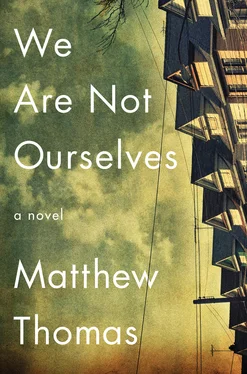Over Thanksgiving break, the college freshmen dropped in like conquering heroes and asked to see Mr. Marku, who came out and gave them big hugs that made Connell unaccountably jealous. They deferred to Connell like a cool older brother, but he didn’t feel cool, and their condescension stung.
He shared an apartment in Greenpoint with a guy he’d met through Todd Coughlin, his old cross-country teammate, whom he’d run into at a concert at the Bowery Ballroom and who lived across the hall. In the evenings, he went to galleries, parties, shows. He dated a girl named Violet, an actress who worked as a bartender. She never questioned his choice of a job, only assumed it was a temporary solution while he figured out the creative direction of his life.
He wrote a check to his mother to pay down some of the college loan principal. She ripped it up in front of him. “Don’t do this on my account,” she said. “I took this tuition on. Don’t think you can pay your loans back and not have to feel guilty about staying at that job.”
He couldn’t figure out why he hadn’t gone back to school in the fall. Partly it felt as if returning would be a lie; as if it would be making a promise to himself, or to his mother, that he couldn’t keep. Then there was the matter of telling his mother he hadn’t graduated in the first place. It wasn’t that he didn’t care to do anything ambitious with his life; he just wasn’t sure what that ambitious thing was yet.
After a few months had passed, the cup of guilt he’d been carrying around — for having gone away when his father needed him, for letting him go into a home — simply dried up, and he was left holding the empty vessel of his routine. He’d stopped feeling he was living someone else’s life, but he hadn’t started feeling he was living his own.
He never checked his bank balance, just kept depositing the checks. There was always enough to pay the bills. He didn’t want to consider the long-term implications of his financial decisions, because the idea of so many years strung together — twenty years, thirty years, forty years — filled him with terror.
In early January, when Peter Marku was admitted to Regis, Connell felt a surge of joy. He wanted Peter to grab the world by the throat, and he took pride in having helped him.
He was invited to a celebratory dinner at the Markus’ apartment. He found it remarkable how quickly he forgot that it was his boss’s quarters. It could have been any Park Avenue apartment. A couple of times the intercom rang, and Mr. Marku rose to answer it. Tony brought a large envelope to the door. Otherwise, it was as if Connell were a valued tutor who had been invited into their home as a reward for his role in securing their son’s advancement. They ate ravioli, shared a couple of bottles of wine, and polished off a delicious cake that Mrs. Marku said was traditionally Albanian.
As they sipped their coffee, Connell looked at Peter’s proud face. The boy’s gratitude was palpable, but it wouldn’t have mattered if it wasn’t, because Connell knew the difference he’d made. That was when it struck him, all at once, that he would very much like to be a teacher. The thing to shoot for, of course, was a college professorship. Even if he managed to get into a decent doctoral program, though — he would have to get his BA first — he wasn’t sure he could survive it. He had enjoyed writing papers in college, but he didn’t have the zest for the professional side of academia — the specialization, the obsessive focus on publication. The most he could hope to do would be to teach high school. That wouldn’t do, though: every generation was supposed to do better than the previous one; every man was expected to surpass the achievements of his father. If he were to become a high school teacher, he would have to accept that he’d never be as successful as his father had been. His mother wanted big things from him, and instead he was manning the door at a building. But at least at the moment he inhabited something that must have looked to the outside world like a chrysalis. If he did this thing he was now imagining doing with his life — which he could now see he might enjoy quite a lot, this helping people through the thorny thicket of adolescence — he would not only remain a disappointment, he would be a bigger disappointment than ever.
He was now a favorite son among the doormen. He had helped deliver the super’s kid to the doorstep of respectability. There would be privileges attached to his new status, something subtly easier about his experience on the job. And something like a home was available in the building — in the lobby, in the locker room in the basement, in this, the super’s apartment. He could come over for more of these dinners. He could live through Peter for at least four years, guiding his decisions, giving him the benefit of his perspective, sending him off to a good college on a scholarship. And when Peter came home from college, and later when he came up to visit from his loft apartment downtown, when he pulled up in front of the building in the company town car, dropping in for dinner with the folks, Connell would open the car door without resentment, because by then he would be old enough not to feel resentment anymore. All he had to do was bide his time. Everything would get simpler once enough years had passed. He wouldn’t need to go anywhere; he could stay in the lobby and the years would come to him.
If you had to pick a perch from which to watch the world go by, Connell thought, the lobby wouldn’t be the worst — especially on quiet summer evenings when you had all the doors open and you got a nice breeze going and dusk was overtaking the city, the setting sun reflecting off the windows on the other side of Park.
When Mr. Marku proffered the coffeepot, Connell held his hand over his mug. Mr. Marku looked determined as he asked if Connell were sure he didn’t want another cup. Mrs. Marku cut another piece of cake, and a queasy feeling of betrayal set in as Connell watched it cover his plate. He knew it was only cake, but it took on a strange, almost numinous power. It felt as if he would be giving up on an idea he had of how his life would go if he ate it. He would be declaring a new oath of allegiance. They were buying his future off for so little: a home-cooked dessert, the promise of further intimacy, a hint of family, an elder brother status of sorts. He had no energy to fight them, not when he had nothing better to argue for. His hand was drawn to his fork and he pressed down into the cake, watching a chunk separate from the rest. He took his hand away from the mug and let it be filled. Peter looked on quietly, taking everything in, an observer more than a person observed. Connell was surprised to suddenly see, with a piercing keenness of perception, that this was no longer his own experience. He was in the middle of an experience Peter was having. He hadn’t seen the usurper coming.
When Eileen was a teenager, she had dreamed of going to Death Valley and sleeping under the night sky and its canopy of stars. As a fifty-eight-year-old woman, she compromised and stayed at the Furnace Creek Inn, a luxury resort.
She went in February, during the cool season, because she’d never been able to stand the heat and didn’t want to bake her pale skin in the sun. Despite this precaution, after the first day, when she took a walk out into the immense emptiness of the desert and felt spooked, she found herself indoors most of the time. She stayed on the resort’s grounds, splitting time between the dining rooms, the fireplace lounges, and a deck chair by the heated pool.
One night she went with a group into the national park. She stood on the Racetrack Playa, which was cracked and dry enough to resemble the skin of a lizard. She didn’t need a guide, or even a rudimentary understanding of astronomy, to know what she was seeing when she looked up, because it was simply and unmistakably the Milky Way. The guide pointed out sailing stones: wandering rocks, he said, pushed along their lonely way by means that had never been explained to anyone’s satisfaction. One of the tourists held forth about how the movement of these rocks might be due to the effects of wind or ice. His grip on the science was shaky, Eileen could tell, his knowledge anecdotal and obviously derived from popular magazines, a pale shade of Ed’s earned erudition. Ed wouldn’t have spoken unless he knew what he was talking about. She would have enjoyed watching him soak it all up, the flickers of a theory in his gaze. She could have taken a lesson from his patience with this nattering tourist. He would have liked the way these stones left a long trail, never coming to rest, defying explanation.
Читать дальше
Конец ознакомительного отрывка
Купить книгу












